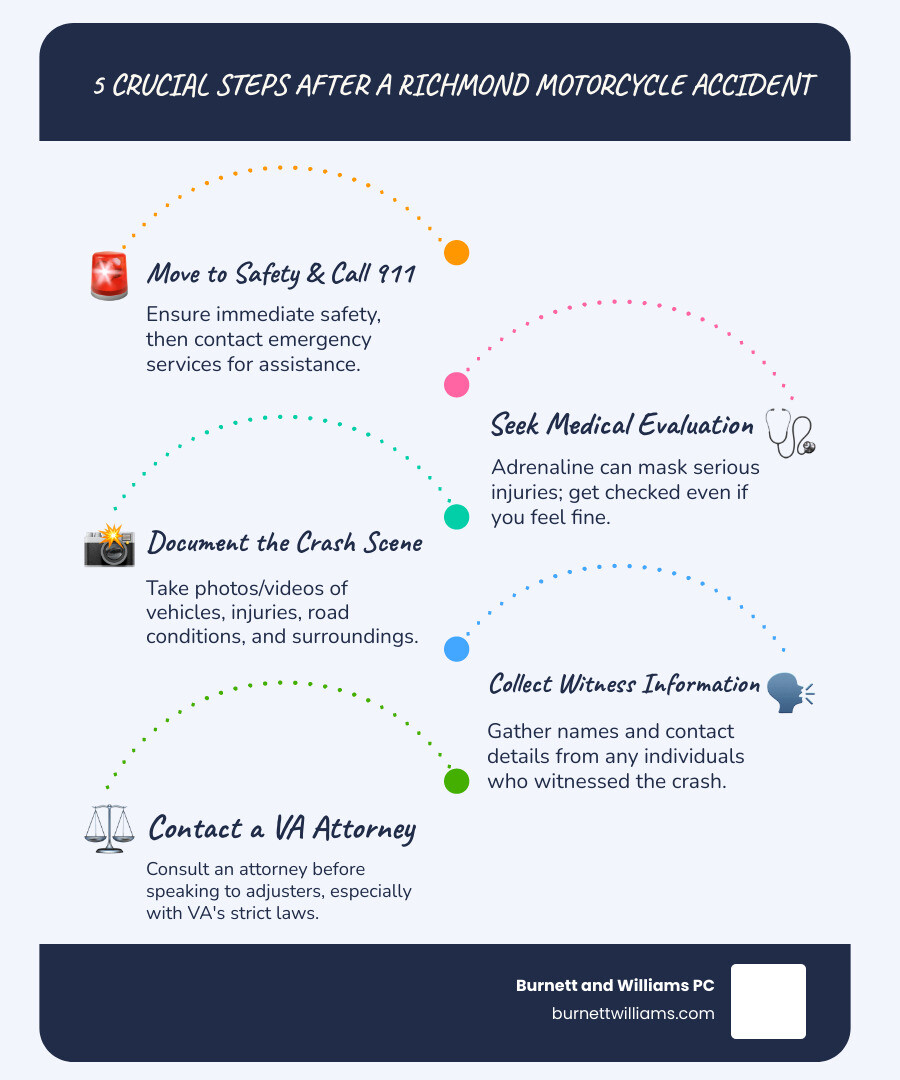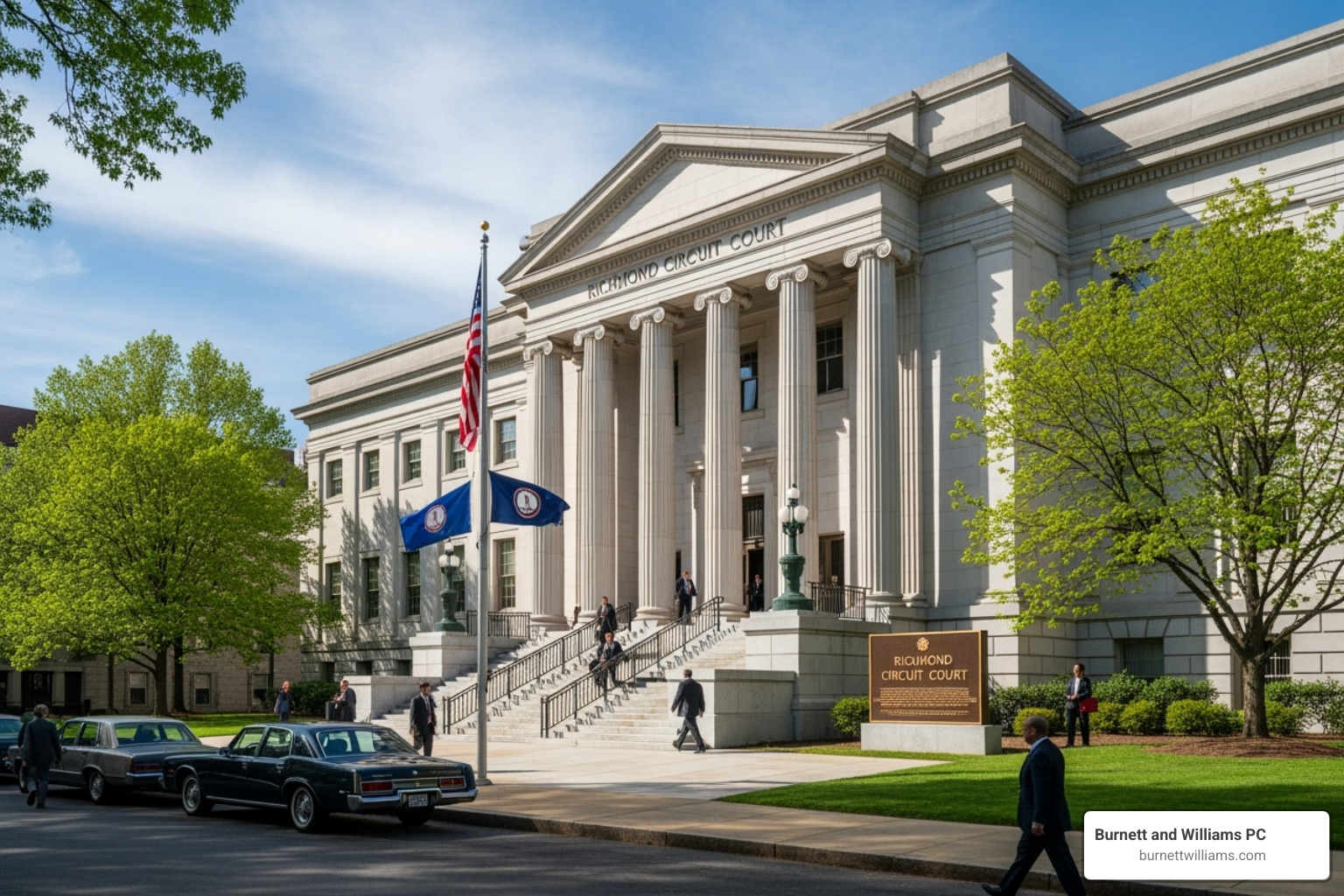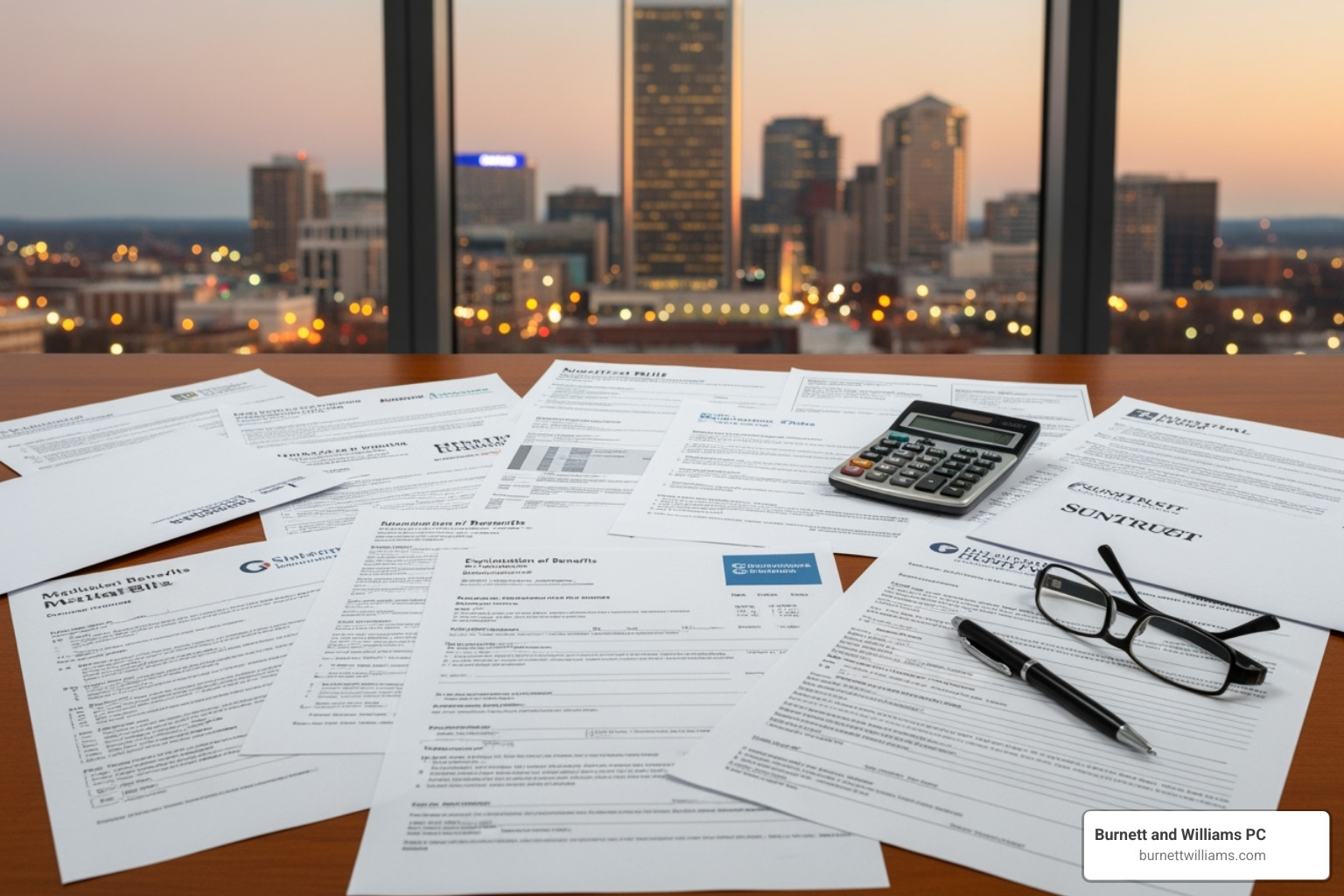Why Richmond Motorcyclists Face Unique Legal Challenges After a Crash
A motorcycle accident Richmond riders experience can shatter lives in seconds. If you’ve been injured, knowing what to do is critical for protecting your health and your legal rights.
Immediate Action Steps:
- Call 911: Request police and paramedics, as some injuries may appear later.
- Document everything: Take photos of the scene, vehicles, and your injuries.
- Get witness information: Collect names and phone numbers.
- Seek medical attention: Adrenaline can mask serious injuries like concussions or internal bleeding.
- Contact an attorney: Speak to a lawyer before talking to insurance adjusters.
Critical Virginia Law Facts:
- You have only two years to file a lawsuit after your accident.
- Virginia’s contributory negligence rule means even 1% fault can prevent you from recovering any compensation.
- Richmond sees hundreds of motorcycle crashes annually on corridors like I-95, I-64, and Broad Street.
Statistics show nearly 80% of Virginia motorcycle accidents result in rider injuries, and motorcyclists are 29 times more likely to die in a crash than car occupants. What makes Virginia so challenging is its strict contributory negligence law. If an insurance company proves you were even slightly at fault, you could get nothing.
This isn’t just about paperwork: it’s about protecting your future when you face medical bills, a totaled bike, and lost income. Understanding Virginia’s unique legal landscape is the first step toward securing fair compensation.

What to Do Immediately After a Motorcycle Accident Richmond
The seconds after a motorcycle accident Richmond crash are a blur of adrenaline and confusion. Knowing what to do can make all the difference in protecting your health and your legal rights. Your first priority is always safety and medical care.
If you can, move yourself and your bike out of traffic, then call 911 immediately. Request police and paramedics, even for minor injuries. Tell medical personnel about every symptom, no matter how small.
Once you are safe, use your smartphone to document everything. Take photos and videos of the scene, vehicle damage, road conditions, traffic signs, and any visible injuries. This evidence can be crucial later.
Collect contact information from any witnesses. Unbiased accounts are invaluable in Virginia. Get names and phone numbers, and ask them to wait for the police if possible.
Crucially, do not admit fault to anyone. Avoid saying things like “I’m sorry” or “I didn’t see you.” Such statements can be used against you. Stick to the facts when speaking with police and do not speculate on the cause of the crash.
Obtaining the Official Richmond Police Report
The police report is a cornerstone of your case, containing the officer’s observations, witness statements, and diagrams. To get your report after a motorcycle accident Richmond, contact the Richmond Police Department’s records division with the date, location, and report number if you have it.
Insurance companies require this report to process claims. It provides an official record, identifies all parties, and documents citations. Request your copy as soon as it’s available and review it for any errors.
Common Causes of Motorcycle Crashes on Richmond Roads
Understanding common crash causes helps in investigating your accident. The biggest threat is often other drivers who fail to see motorcyclists, leading to several common scenarios.
- Left-Hand Turns: A driver turning left across your path is a leading cause of serious crashes. They may misjudge your speed or not see you at all, as has happened at intersections like Libbie and Fitzhugh Avenues.
- Distracted Driving: Drivers who are texting, using GPS, or are otherwise inattentive often pull out in front of riders or drift into their lane without warning.
- Blind Spot Collisions: Drivers changing lanes without a proper shoulder check can merge directly into a rider’s path.
- Road Hazards: Richmond’s roads can have their own dangers. Potholes on Broad Street, loose gravel on I-64 ramps, and uneven pavement can be treacherous, especially in the rain. According to the Federal Highway Administration, road defects contribute to many serious crashes.
In nearly 40% of Virginia motorcycle crashes, the rider was not cited for any violation. The issue is often inattentive drivers and dangerous road conditions, not reckless riding. We investigate all these factors to build a strong case and prove the other party’s negligence.
The Harsh Reality: Virginia Law and Your Claim
After a motorcycle accident Richmond riders face, the legal road ahead can be as treacherous as the physical recovery. Virginia’s laws create unique obstacles, making careful legal guidance essential to protecting your right to compensation.
Virginia’s legal system has little room for error. The Commonwealth’s strict approach to fault means that even a strong case can be lost without a sound legal strategy.
Virginia’s Strict Contributory Negligence Rule
Virginia follows a harsh fault rule known as contributory negligence. Under this all-or-nothing rule, if an insurance company can prove you were even 1% responsible for your crash, you can be barred from recovering any money at all.
Insurance companies exploit this rule by scrutinizing every detail of your crash. They might claim you were speeding, changed lanes improperly, or could have braked sooner to argue you share fault and therefore owe you nothing. This is why building an airtight case is so important. We gather all available evidence, from surveillance footage to witness statements, to prove the other driver was entirely at fault.
The Two-Year Clock: Virginia’s Statute of Limitations
The clock starts ticking the moment your crash occurs. In Virginia, you have two years from the date of the accident to file a personal injury lawsuit. If you miss this deadline, your claim is permanently barred, regardless of your injuries or the other driver’s fault.
Two years passes quickly when you are focused on medical treatments and negotiations with insurers. It is critical to act quickly to preserve your legal options.
Furthermore, claims against government entities, like the City of Richmond, have even shorter deadlines. You typically must file a formal notice of claim within six months. You can learn more about how a Virginia personal injury lawyer can help you steer these strict timeframes.
The Role of Helmets in a Motorcycle Accident Richmond Case
Virginia law requires all riders to wear a helmet. While helmets save lives, what happens if you weren’t wearing one during your crash? It does not automatically destroy your claim. The other driver’s negligence is what caused the accident, and that remains the focus.
However, an insurance company will use the lack of a helmet against you. They will argue that your head injuries would have been less severe and claim you contributed to your own injuries. We counter this by focusing relentlessly on what caused the crash: the other driver’s negligence. While helmet use is part of the discussion, it does not erase the other driver’s responsibility.
Securing Fair Compensation: Insurance and Damages
After a motorcycle accident Richmond, dealing with insurance companies is another major challenge. Adjusters may seem helpful, but their goal is to minimize payouts for their employer. Understanding their tactics and the compensation you are owed is key to your financial recovery.
Navigating Insurance Company Tactics
Insurance adjusters use proven strategies to reduce claim values. Be aware of these common tactics:
- Requesting a Recorded Statement: Giving a statement to the at-fault driver’s insurer without an attorney can damage your claim. Inconsistencies can be used to question your credibility or shift blame.
- Offering a Quick Settlement: Early, lowball offers are tempting but rarely cover the full extent of your injuries and future needs. Once you accept, you cannot seek more compensation.
- Downplaying Injuries and Shifting Blame: Adjusters may suggest your injuries are not severe or existed before the crash. They will also look for any reason to apply Virginia’s contributory negligence rule to deny your claim entirely.
Having an attorney handle all communications with adjusters is vital. We know their tactics and ensure your claim is taken seriously.
What Types of Damages Can You Claim in Virginia?
In Virginia, you can seek compensation for all losses from a motorcycle accident Richmond. These damages fall into two main categories.
Economic damages are your calculable financial losses. This includes:
- Medical Expenses: All costs from the ambulance ride to future surgeries, physical therapy, and medications.
- Lost Wages: Income lost while you were unable to work.
- Diminished Earning Capacity: Compensation if your injuries prevent you from earning the same income in the future.
- Property Damage: The cost to repair or replace your motorcycle and other damaged property.
Non-economic damages cover the non-financial impacts of your injuries. This includes:
- Pain and Suffering: Compensation for the physical pain and discomfort you have endured.
- Emotional Distress: For the psychological impact, such as anxiety, depression, or PTSD.
- Loss of Enjoyment of Life: If your injuries prevent you from participating in hobbies and activities you once loved.
In rare cases of extreme recklessness, like a drunk driving crash, Virginia courts may also award punitive damages to punish the wrongdoer. We work to ensure every aspect of your loss, both present and future, is fully accounted for in your claim.
Frequently Asked Questions about Richmond Motorcycle Accidents
What are the most dangerous areas for motorcyclists in Richmond?
While any road can be dangerous, certain areas see more motorcycle accident Richmond incidents. High-risk locations include:
- Interstate Highways: The I-95 and I-64 interchanges are challenging due to high speeds, heavy traffic, and aggressive lane changes.
- Congested City Streets: Major roads like Broad Street and Cary Street have heavy stop-and-go traffic and frequent intersections, increasing risk.
- Left-Turn Intersections: Intersections where drivers turn left across traffic, like Libbie and Fitzhugh Avenues, are consistently dangerous as drivers often misjudge a motorcycle’s speed or fail to see it.
Statistics also show that late afternoon hours (3-7 PM) on weekends are particularly dangerous times to ride in Virginia.
What if the other driver’s insurance company blames me for the crash?
This is a common tactic. Insurance adjusters use Virginia’s contributory negligence rule to deny claims by arguing you were partially at fault. They may claim you were speeding or could have avoided the crash. Do not argue with the adjuster.
Instead, focus on building a strong case with compelling evidence. Witness statements, photos from the scene, and traffic camera footage can prove what really happened. We often use accident reconstruction experts to scientifically demonstrate fault. An experienced attorney knows how to counter these blame-shifting tactics.
How much is my motorcycle accident claim worth?
Every motorcycle accident Richmond claim is unique, so there is no “average” settlement. The value depends on several factors:
- Severity of Your Injuries: A traumatic brain injury will result in a much higher value than minor road rash. The more severe the injury, the higher the potential value of the claim.
- Medical Costs: All past and future medical expenses are a major component of your claim’s value.
- Lost Income: Your claim includes wages lost during recovery and any reduction in your future earning capacity.
- Impact on Quality of Life: Compensation for pain, suffering, emotional distress, and loss of enjoyment of life is also included.
- Strength of Evidence: Clear proof of the other driver’s fault strengthens your negotiating position and increases your claim’s value.
We evaluate every aspect of your case to determine its full value and pursue the maximum compensation you deserve.
Conclusion
The aftermath of a motorcycle accident Richmond riders experience is overwhelming, and Virginia’s difficult legal system only adds to the stress. The strict contributory negligence rule and a two-year filing deadline create significant problems to fair compensation.
Taking the right steps after a crash is critical, but the most important one is getting experienced legal guidance before speaking to an insurance adjuster. Attorneys Jim Williams and Kimberly Raab at Burnett & Williams PC understand the challenges Virginia motorcyclists face. We know how to counter insurance company tactics and build the strong case needed to overcome Virginia’s tough standards.
Your recovery shouldn’t include a fight with insurers. We are here to help you steer the process with responsive, caring service. Learn more about how a Virginia personal injury lawyer can help you protect your health and financial future.


